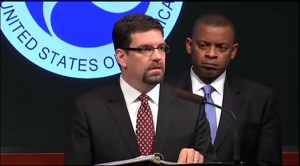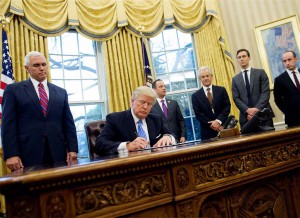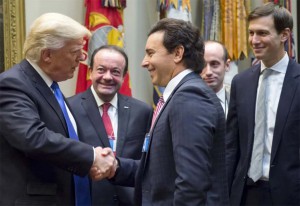
Former NHTSA Deputy Administrator David Friedman called on the Trump administration to leave CAFE unchanged.
The Trump administration is courting economic and environmental disaster if it elects to heed to the initial wishes of automakers and rolls back Corporate Average Fuel Economy standards, according to a panel of consumer, economic and environmental safety advocates.
A group of five advocates asserted that President Trump’s desire to rollback fuel economy and emission standards to levels below the Obama-era mandate will ultimately harm consumers, the environment and the economy.
“The current CAFE requirements are good for consumers — period,” said David Friedman, director of Cars and Product Policy, Consumers Union, during a conference call. “The rollback the industry has sought and this administration has delivered will hurt consumers.”
Friedman, who was once head of the National Highway Traffic Safety Administration, was joined by Paul Billings, national senior vice president, American Lung Association; Ken Locklin, director of Business Development, Impax Asset Management; Jack Gillis, incoming executive director of the Consumer Federation of America; and General Donald Hoffman (ret.), Air Force Materiel Command.
(Ford supports keeping tougher CAFE standards after push by enviro groups. Click Here for the story.)

President Donald Trump's rollback of Obama administration CAFE standards is now opposed by automakers in the U.S.
The group contends that despite recent declarations that they are in favor of keeping CAFE rules where they are and that a single national standard is what they want, automakers asked for the change and Trump is simply giving them what they want.
“What we have here is a case of the dog catching the car,” Gillis said, noting that “every one of the manufacturers wrote to the president after the election asking for reprieve from the standards.”
Gillis is referencing a February 2017 letter from the Alliances of Automobile Manufacturers citing several reasons for tossing out the Obama administration’s decision to implement the final stage of CAFE, which centers on a 54.5 mpg fleet average.
(Click Here to see more about the auto industry backing away from CAFE cuts.)
Friedman said the about-face by automakers should be taken with caution. “I would agree we’re getting confusing messages from the auto industry. They want to project an image that they want to do more. They always talk about flexibility, but in my experience that is a code word for loophole. I’d like to see an automaker come in with a plan.”
However, much of the focus of the group centers on economics. They note that during times where fuel economy averages were set to move higher, automotive sales have been strong. Perhaps just as importantly, consumers see value in more fuel-efficient vehicles.
“Consumers want these fuel efficiency standards and they are willing to pay for them,” Gillis noted. “Fuel efficient vehicles sell much better than their less efficient (predecessors). A roll back could have a devastating impact if they decide to not keep up the standard.”
(To see more about why 1 in 5 Americans wants to own an EV, Click Here.)
Friedman also noted that when at full implementation that not only will consumers save as much as $4,800 due to the improved fuel efficiency of their new vehicles, but the staggered implementation of the tougher standards has saved them thousands. He also pointed out those savings are often plowed into the purchase a newer, safer car so tougher fuel economy mandates also translate to safer roads.


“Perhaps just as importantly, consumers see value in more fuel-efficient vehicles.”
What rubbish! Have you not paid attention to what the market wants, Cars out, Trucks in! Ford can’t give away Fiesta and Focus cars and can’t make enough F-Series (but that’s a different story). How many hybrids and electrics are sold? Teslas are selling what they are able to make, but that’s more of a cult than a trend.
There is nothing stopping the OEMs from setting their own high MPG standard and promoting it — see where that gets them. If the government wants to increase vehicle mileage, increase the fuel tax by $1 per gallon and put that money toward improving the roads. People will decide what is more important, driving behemoths or saving money.
Sorry, Dick, but you’re missing the market. Fuel economy does sell. It is often the differentiator between Model A and Model B SUV. Ute buyers are prone to stepping down from, say, midsize to compact, and research shows that they feel they’re getting much the same usable space BUT better mileage by doing so. And on and on. Sorry, but all the research shows that even Trump supporters list fuel economy as one of the top 4 or 5 influences when shopping for a new vehicle.
Paul E.
As usual, Paul is right. Is it ‘still’ or ‘again?’
Though Dick is also right. Yep, its true! Very much so….
Consumers are picking larger vehicles in light truck category – pickups, vans SUVs, SUTs, CUTs, and those with an all-wheel drive platform.
In Colorado, we track new vehicle registrations by brand and type. Over past ten years, light trucks have gained sales from 58% in 2008 to 71% in 2017. The pace seems to be accelerating (no pun intended), as the jump just between 2016 and 2018, Colorado light truck sales jumped from 66.7% to 71.2%. So the one year jump representing going from right at two out of every three vehicles to three out of every four.
We believe:
– We need one national standard v multiple standards state by state. While Obama rules are tough, every automaker is on track to meet them.
– Dick’s preference for a fuel tax increase actually makes total sense. The rate hasn’t changed in years. If that modifies human behavior, it is better that way than incentive money such as is in place at federal level and state level in some places. All the while Congress is trying to figure out an infrastructure bill. A gas tax increase, rolled in over time, would gradually move people to newer, cleaner cars, all the while increasing funding for poorly maintained highways, streets, bridges and other infrastructure.
– All the while, as cool as electrics are (and they are very cool) there has to be developed a system under which they pay their own fair share for highways and infrastructure. Paying consumers to drive off in shiny new EVs, with federal incentive of $7500, and here in Colorado, another $5000 with no provision for those vehicles to pay their way on our Highway Trust Fund (gas tax) infrastructure, makes no sense. And is truly unsustainable, as ironic as that may sound.
Tim
Tim, some very good points…which is your norm.
First, the automakers really ARE on target and I’ve had several chief engineers tell me that getting to the actual number — low-mid-40 mpg range after factoring in credits, etc. — likely can be done with less electrification than originally expected;
Second, I hope I did not dismiss Dick’s call for an increase in the national gas tax. I think people SHOULD pay as they go, and we need to have a reasonable assessment of what the roadway infrastructure requires and taxes that support this. And transportation should be viewed as a universe that includes appropriate mass transit;
Finally, anyone who has driven the latest electrics cannot help but be pleasantly surprised, especially the next-gen PHEVs and BEVs. They are, if designed and engineered properly, quick, smooth, fun to drive. They actually can deliver some advantages over gas models beyond just tailpipe emissions. And the disadvantages are diminishing, whether range, cost, weight, charging time, etc.
Let me expand upon the latter: the debate needs to be one of apples-to-apples. If you are talking about ANY form of personal transportation you need to be considering things beyond the immediate MSRP. Think about this: how much of our federal taxes are devoted to supporting the development and support of oil resources? Critics would point out the billions spent to protect the global oil distribution system, (never mind the socio-political costs). What are the health and environmental costs? we cannot ignore the effects of pollution, whether on the plant or our persons. (And, I should argue, battery-car fans need to consider everything from the source of electric power to the raw materials, such as lithium, that go into electrified vehicles.)
The reality is that EVERY new form of transportation has enjoyed initial government subsidies, whether the early American merchant fleets, canals, railroads, airplanes or, yet, the gas-powered automobile. To suddenly say a radical technology like EVs should suddenly AND IMMEDIATELY carry 100% of its own weight is disingenuous. Hell, we subsidize the electric grid! But we also shouldn’t accept the idea that EVs get a free ride forever. The debate should balance all the above factors and come up with a reasonable strategy meant to encourage cleaner tech and, as it goes mass market, and as technology improves while costs fall, we should phase in towards a point where it carries its own weight.
Paul E.
Just our of curiosity, regarding road taxes, would’t it be possible, with all of the computers on new and newer vehicles, to charge by the number of miles a vehicle is driven, and factor in the weight of the vehicle to come up with a final calculation for the cost-per-mile charge? I am assuming that the weight of the vehicle has a direct bearing on the amount of stress the vehicle places on roadways. My thought here is that this would eliminate any bias for or against any particular category of vehicle. Europe and Japan used to tax vehicles (I assume yearly) based on the displacement of the engine. With electric and hybrid now becoming a factor, that wouldn’t work well anymore (if they are even taxing as they once did).
Yes, Allen, it would be possible to charge by the mile and there have been several such experiments but the concept has yet to catch on more broadly, perhaps because of concerns about privacy, as well as fear governments might use that to excessively increase tax revenues.
Paul E.